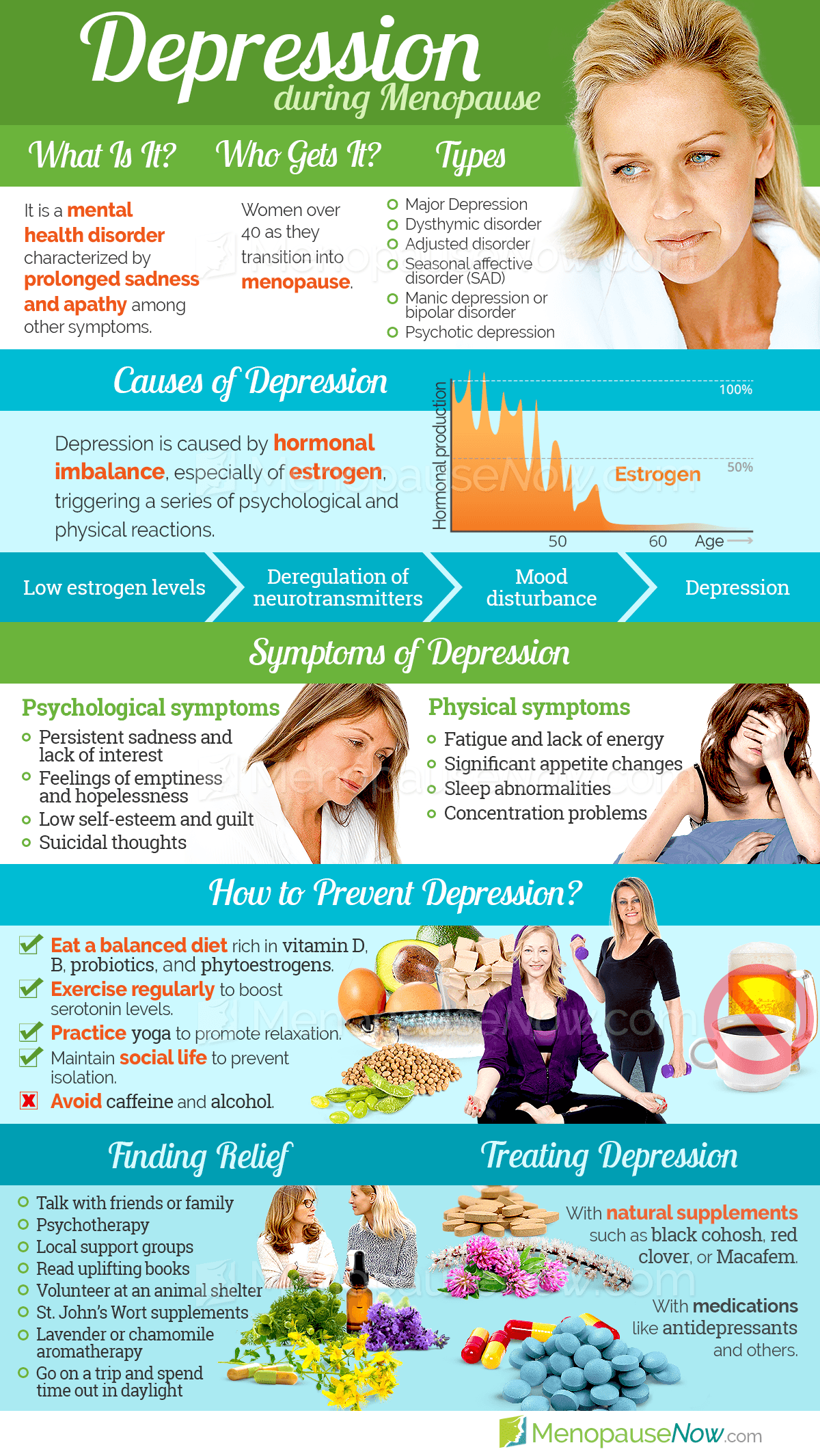Depression is a common yet potentially serious menopause symptom. It entails more than the occasional bout of sadness and, if not treated, can negatively impact overall quality of life.
Women are especially susceptible to depression, particularly during stages of hormonal fluctuation, such as menopause. Women ages 45 - 55 are four times more likely to have depression than women who have not yet reached that stage in life.
One of the reasons that women, especially during menopause, are more likely to suffer from depression is due to hormonal imbalance. Continue reading to learn all about depression, its signs and symptoms, causes, and treatment options.
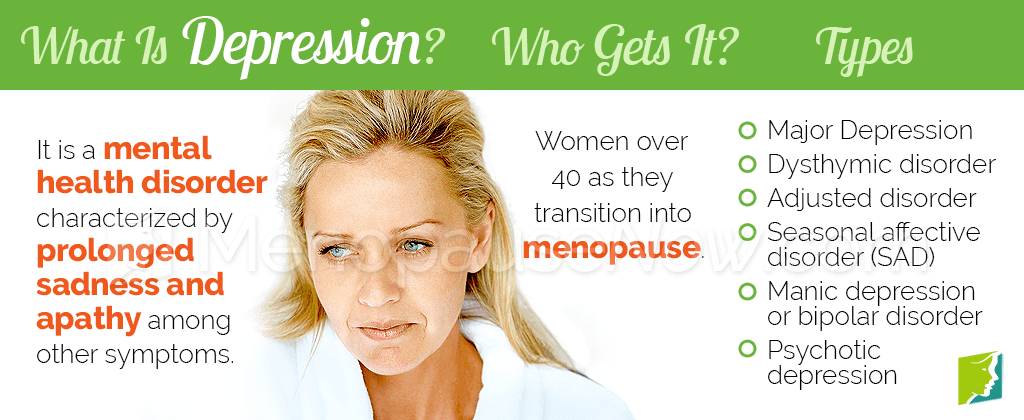
About Depression
Depression refers to a mental state characterized by a pessimistic sense of inadequacy, feelings of sadness, and a despondent lack of activity. Because depression is a clinical mental disorder, it's important to distinguish feelings of sadness and despondency from clinical depression.
Clinical depression is more severe than brief periods of sadness. It is a serious mental illness characterized by more than two weeks of extremely low moods that affect how a person feels, thinks, and acts.
Types of depression
There are six main types of depression. Some are more closely related to menopause than others. The following are categories of depression linked to menopause:
Did You Know?
Untreated depression can lead to a greater risk of heart attacks and osteoporosis.
Major depression. This lasts for more than two weeks and is characterized by intense feelings of sadness, loss of interest in normal activities, withdrawal from friends and family, and negative thoughts.
Dysthymic disorder. Less intense than major depression, dysthymia often lasts for longer, normally for two years or more.
Adjustment disorder. This is often brought on by a stressful event or situation. It can be acute, lasting less than six months, or chronic, lasting longer than six months.
Seasonal affective disorder (SAD). This type of depression is triggered by the seasons and most commonly caused by a lack of sunlight in the winter months.Other types of depression less associated with menopause, but just as severe, include the following:
- History of depression
- Stress
- Smoking or quitting smoking
- Drug and alcohol use
- Surgical or medical menopause
Manic depression or bipolar disorder. This psychological disorder causes unusual shifts in a person's mood, energy, and ability to function, characterized by alternating episodes of mania and episodes of depression. Symptoms can be very severe.
Psychotic depression. This includes some features of psychosis, such as hallucinations, delusions, and irrational thoughts and fears.
Risk Factors for Depression
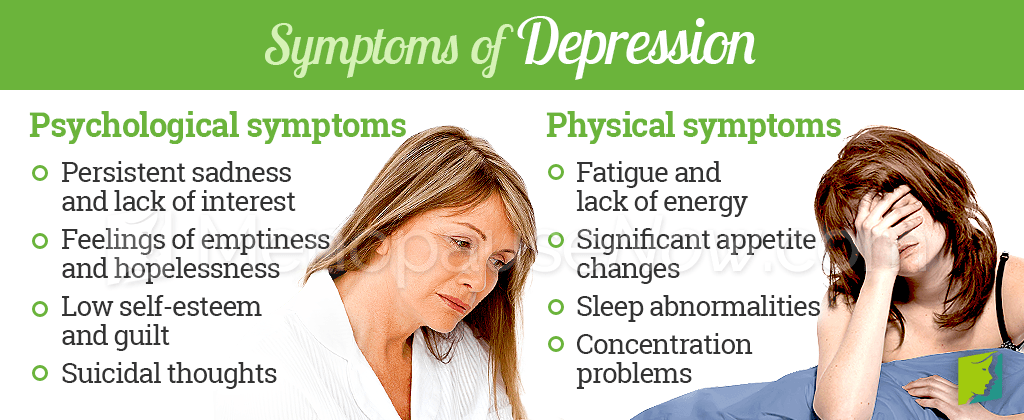
Click on the following link to read more about depression, or continue reading below to learn about the signs and symptoms of depression.
Depression Signs and Symptoms
Because depression is a mental disorder, it's important to pinpoint the symptoms associated with it. The symptoms can be separated into three categories: physical, emotional, and behavioral symptoms. In order for depression to be diagnosed, at least five symptoms must be present for no less than two weeks, and at least one of those five must either be persistent feeling of sadness or loss of interest or pleasure. Here are the other signs and symptoms:
Physical symptoms
- Fatigue
- Decreased energy
- Overeating
- Appetite loss
- Insomnia
- Early-morning wakefulness
- Excessive sleeping
- Persistent aches or pains
- Headaches, cramps, or digestive problems that do not ease even with treatment
Emotional Symptoms
- Persistent sad, anxious, or "empty" feelings
- Feelings of hopelessness and pessimism
- Feelings of guilt, worthlessness, and helplessness
- Irritability
- Restlessness
- Thoughts of suicide or suicide attempts
Behavioral symptoms
- Loss of interest in activities or hobbies once pleasurable, including sex
- Difficulty concentrating
- Difficulty remembering details
- Difficulty making decisions
- Neglecting responsibilities
- Failing to attend to one's physical appearance
Click on the following link to read more about the signs and symptoms of depression, or continue reading below to learn about the possible causes of depression.
Causes of Depression
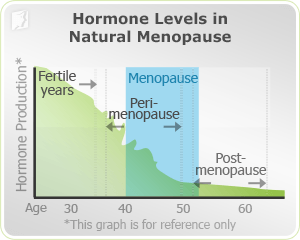
The underlying cause of depression in menopausal women involves hormonal imbalance, especially decreased levels of estrogen. As women approach menopause, their estrogen levels begin to drop off. Estrogen plays an integral part in regulating brain functions, especially neurotransmitters that influence mood, such as serotonin. Decreasing estrogen levels during menopause can also cause other physical and mental symptoms, such as hot flashes and anxiety, which can contribute to depression.
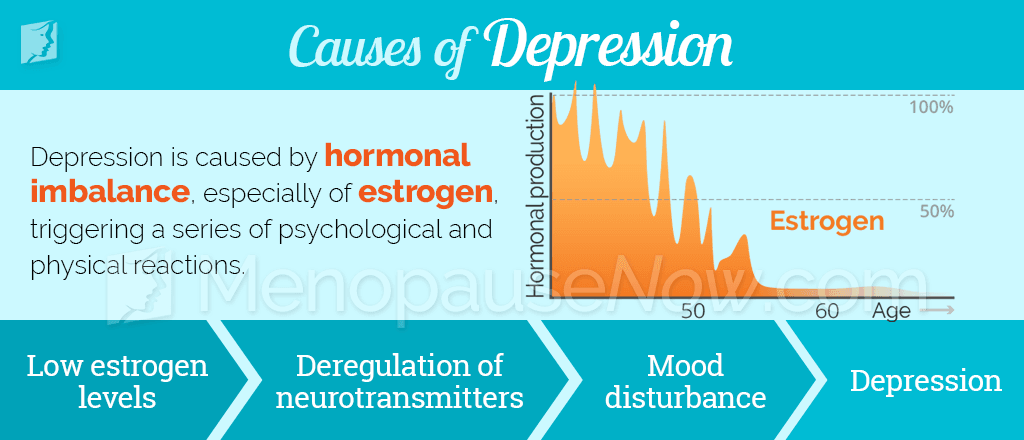
Other causes include biochemical, genetic, personality, and environmental factors, as well as other diseases.
Click on the following link to learn more about the causes of depression, or continue reading to find out about all the different treatment options for depression.
Depression Treatments
Although depression can make a woman feel hopeless, a variety of treatment options exist that can treat her depression and improve her overall quality of life. It is generally recommended that women begin with the least invasive option, which would be lifestyle changes. In the case of depression, this involves steps such as making sure to get regular exercise, eating healthy, and practicing mind-body techniques like meditation or yoga.
By simply including five 30-minute sessions of physical activity such as walking, jogging, swimming, and cycling into a weekly routine, a woman can greatly relieve her milder depression symptoms.
Similarly, a healthy diet will also help to stabilize mood swings and alleviate depression. Lifestyle changes are an important first step to tackling depression, but there are other treatment options available if a woman needs further help treating her symptoms.
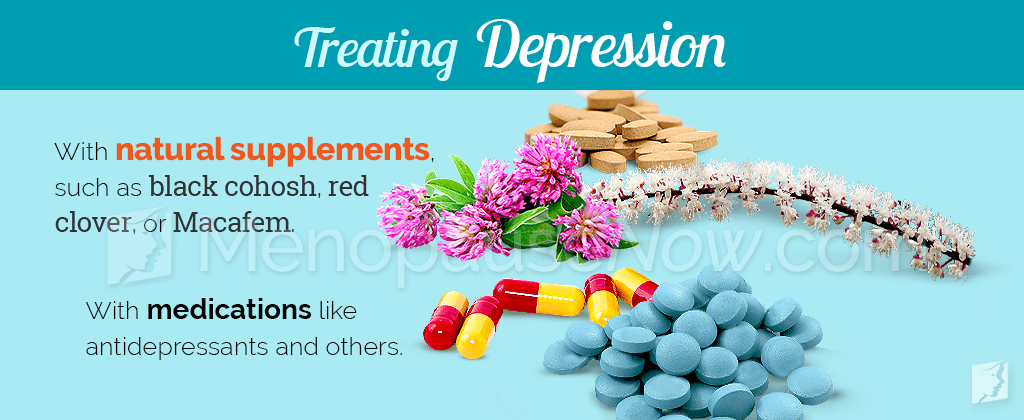
The most effective approach, since depression in menopausal women is primarily caused by a hormonal imbalance, is to treat the problem directly at the source. A variety of natural and alternative supplements exist that may be able to address this imbalance.
For more prolonged or severe cases of depression, it may be necessary to consider pharmaceutical options. It is recommended that a woman consult a trusted medical professional before beginning such treatments in order to better understand the potential benefits and risks involved.
Click on the following link to read more specifics about each of the treatments for depression in order to learn how to alleviate this symptom in a safe and effective way.
Sources
- Amin, Z. , Canli, T. & Epperson, C.N. (2005). Effects of Estrogen-Serotonin Interactions on Mood and Cognition. Behavioral and Cognitive Neuroscience Reviews, 4(1), 43-58. Retrieved from http://www.ncbi.nlm.nih.gov/pubmed/15886402
- Lane, A.M. & Lovejoy, D.J. (2001). The effects of exercise on mood changes: the moderating effect of depressed mood. The Journal of Sports of Medicine and Physical Fitness, 41(4), 539-545.
- National Institutes of Health. (2014). Learn to manage stress. Retrieved May 6, 2016, from https://www.nlm.nih.gov/medlineplus/ency/article/001942.htm
- Office on Women's Health. (2010). Menopause and mental health. Retrieved May 6, 2016, from http://womenshealth.gov/menopause/menopause-mental-health/
- University of Michigan Depression Center. (n.d.). Depression During Menopause. Retrieved May 6, 2016, from http://www.depressiontoolkit.org/women/menopause.asp

